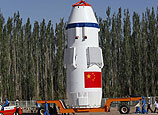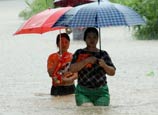
BEIJING, June 10 (Xinhua) -- People in this part of the world woke up Monday morning finally getting an encouraging sign on the perennially volatile Korean Peninsular.
After months of super high tensions featuring heated talks of war and intensive saber rattling, the Democratic People's Republic of Korea (DPRK) and the Republic of Korea (ROK) agreed earlier in the day to hold their first high-level meeting in six years later this week.
Media reports from the DPRK and ROK both confirmed the formal government-to-government meeting will be held in South Korea's capital Seoul on Wednesday and Thursday.
Potential topics include "normalizing the operation of the Kaesong Industrial Zone, the issue of resuming the tour of Mt. Kumgang, the issue of reunion of separated families and their relatives and other humanitarian issues."
It is worth noting that the two delegations will be led by ministerial officials who have the experience and authority to resolve tricky inter-Korean issues, a fact that could make the meeting more about substance.
Sure, Rome is not built in one day. The dilemma on the Korean Peninsular has been born of decades of estrangement and hostility between the two sides.
No one expects the upcoming meeting to turn the decades-old foes into amicable partners immediately, but their joint decision to hold a formal meeting in itself is an encouraging sign that shows both sides are ready for talks after months of angry name-calling.
China, as a critical stake-holder in the region, is more than happy to see the DPRK and ROK to sit down for talks. As a close neighbor of both sides, China has long called for restraint and calm amid rising tensions.
Chinese officials have repeatedly said that their country will not allow anyone to start a war at its doorsteps.
But peace and stability serves more than the national interests of China alone.
First and foremost, the DPRK and ROK will benefit most from improved inter-Korean relations.
Meanwhile, talks and possible agreements between the DPRK and ROK also serve the interest of other parties in the region, especially Japan, the United States and Russia.
To help the encouraging sign of talks sustain, all relevant parties should do their job too.
Washington has always been the elephant in the room when it comes to defusing tensions on the Korean Peninsular. It has to find a way to reduce deep-rooted mutual suspicions with Pyongyang.
For Japan, its rightist politicians should tone down its provocations against the DPRK and learn to act like a real constructive power in the region.
Altogether, China, the United States, Russia, Japan, the DPRK and ROK should work together to restart the long-stalled six-party talks, which still remains the only viable platform not only for resolving the nuclear issue on the Korean Peninsular, but also for constructing a long-term security framework in northeast Asia.


















![]()
